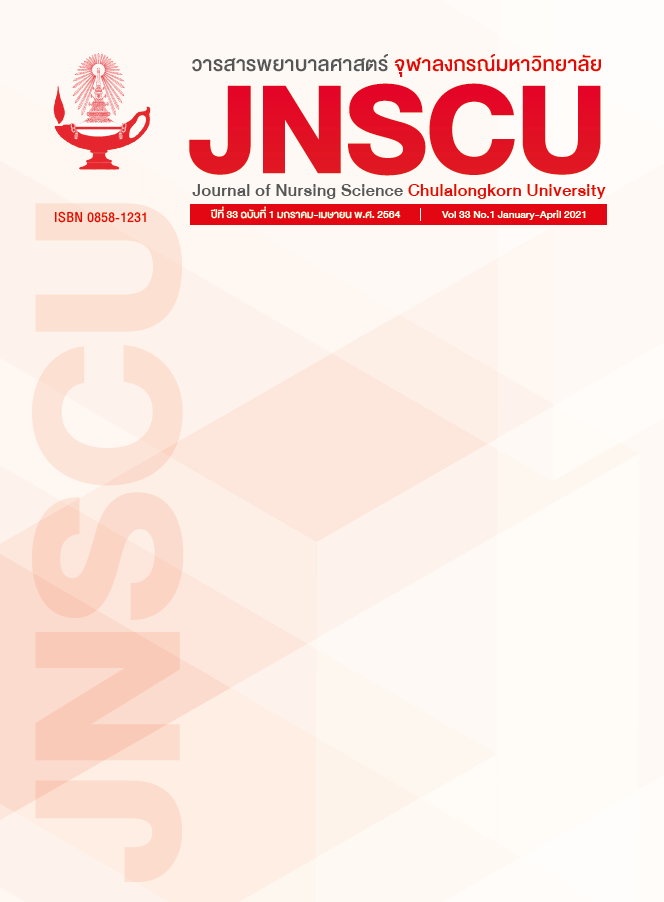ความรู้ในการดูแลผู้ป่วยระยะสุดท้ายของนักศึกษาพยาบาลชั้นปีที่ 4 คณะพยาบาลศาสตร์ มหาวิทยาลัยธรรมศาสตร์
คำสำคัญ:
ความรู้, การดูแลผู้ป่วยระยะสุดท้าย, นักศึกษาพยาบาลชั้นปีที่ 4บทคัดย่อ
วัตถุประสงค์: เพื่อประเมินความรู้ในการดูแลผู้ป่วยระยะสุดท้ายของนักศึกษาพยาบาลชั้นปีที่ 4 ปีการศึกษา 2560 คณะพยาบาลศาสตร์ มหาวิทยาลัยธรรมศาสตร์
แบบแผนงานวิจัย: การวิจัยเชิงพรรณนา
วิธีการดำเนินการวิจัย: กลุ่มตัวอย่าง คือ นักศึกษาพยาบาลชั้นปีที่ 4 ที่กำลังจะจบการศึกษา จำนวน 81 คน เครื่องมือที่ใช้ในการวิจัยประกอบด้วยแบบสอบถามข้อมูลทั่วไป และแบบวัดความรู้ในการดูแลผู้ป่วยแบบประคับประคองของพยาบาล ซึ่งได้ตรวจสอบความเชื่อมั่นในกลุ่มนักศึกษาพยาบาลชั้นปีที่ 4 ที่กำลังจะจบการศึกษา คณะพยาบาลศาสตร์ มหาวิทยาลัยสวนดุสิต จำนวน 30 คน วิเคราะห์หาค่าความสอดคล้องภายในเนื้อหาโดยใช้วิธีของ Kuder-Richardson สูตร KR-20 ได้ค่าความสอดคล้องภายในเนื้อหา 0.81 วิเคราะห์ข้อมูลโดยใช้สถิติเชิงพรรณนา
ผลการวิจัย: นักศึกษาพยาบาลชั้นปีที่ 4 ปีการศึกษา 2560 คณะพยาบาลศาสตร์ มหาวิทยาลัยธรรมศาสตร์ มีคะแนนเฉลี่ยความรู้ในการดูแลผู้ป่วยระยะสุดท้ายในภาพรวมอยู่ในระดับต่ำ ( = 11.26, SD = 2.36) คะแนนเฉลี่ยด้านความรู้ทั่วไป และด้านการจัดการอาการอยู่ในระดับต่ำ ( = 2.38, SD = 1.14; = 6.62, SD = 1.87) คะแนนเฉลี่ยด้านการดูแลด้านจิตสังคม จิตวิญญาณอยู่ในระดับปานกลาง ( = 2.26, SD = 0.49)
สรุป: ผลการศึกษานี้สามารถใช้เป็นข้อมูลในการพัฒนาการจัดการเรียนการสอนเพื่อเสริมสร้างความรู้การดูแลผู้ป่วยระยะสุดท้ายให้นักศึกษาต่อไป
เอกสารอ้างอิง
Nilmanat K. International perspective palliative
care in Thailand: Development and
challenges. Canadian oncology nursing
journal 2016; 26(3): 262-4.
Wright M, Wood J, Lynch T, Clark D. Mapping
levels of palliative care development:
a global view. Journal of pain and
symptom management 2008; 35(5):
-85. Doi: 10.1016/j.jpainsymman.
06.006.
Thai Palliative Care Society. The Thai Palliative
Care Society [Internet]. 2018 [cited 2018
October 18]. Avaliable from: http://
www.thaps.or.th/.
Thai Palliative Care Nurses Society. The Thai
Palliative Care Nurses Society [Internet].
[cited 2018 October 18]. Avaliable
from: https://palliativenursessocity.
wordpress. com/.
Sittichanbuncha Y. Development of palliative
care in Thailand. In: Nagviroj K, editor.
Manual: Care for patients at the end of
life and their families. Bangkok: Thai
Palliative Care Society; 2016: p.187-93.
Lynch T, Connor S, Clark D. Mapping levels
of palliative care development: a global
update. Journal of pain and symptom
management 2013; 45(6): 1094-106.
Doi: 10.1016/j.jpainsymman.2012.05.
Lloyd-Williams M, Field D. Are undergraduate
nurses taught palliative care during their
training? Nurse education today 2002;
(7): 589-92.
Johnson A, Chang E, O’Brien L. Nursing the
dying: A descriptive survey of Australian
undergraduate nursing curricula.
International journal of nursing practice
; 15(5): 417-25. Doi: 10.1111/
j.1440-172X.2009.01790.x.
Akarathanarak T, Kongsuwan W, Matchim Y.
New registered nurses’ knowledge in
caring for patients at the end of life.
Songklanagarind journal of nursing 2014;
(2): 103-16. (In Thai)
Balicas MR, Lunsford B, Farrell ER. The effect
of palliative care nursing education to
improve knowledge in palliative care of
hospital-based nurses caring for patients
with chronic, serious illness [Doctor of
Nursing Practice Projects in Health
Sciences]. The United States: George
Washington University; 2018.
Faculty of Nursing Thammasat University.
Undergraduate curriculum and courses
[Internet]. 2019 [cited 2019 September
. Avaliable from: https://nurse.tu.
ac.th/bachelor.
Ross MM, McDonald B, McGuinness J. The
palliative care quiz for nursing (PCQN):
the development of an instrument to
measure nurses’ knowledge of palliative
care. Journal of advanced nursing 1996;
(1): 126-37.
Pope A, Mareno N, Hart P. Palliative care
knowledge among bachelors of science
nursing students. [Master’s thesis in
Nursing Education]. Georgia: Kennesaw
State University; 2013.
Dimoula M, Kotronoulas G, Katsaragakis S,
Christou M, Sgourou S, Patiraki E.
Undergraduate nursing students’
knowledge about palliative care and
attitudes towards end-of-life care:
A three-cohort, cross-sectional survey.
Nurse Education Today 2019; 74: 7-14.
Doi: 10.1016/j.nedt.2018.11.025.
Yamane T. Statistics, An Introductory
Analysis. 2nd ed. New York: Harper and
Row; 1967.
Satsin T, Matchim Y, Thongthawee B.
Emergency nurses’ competency in the
provision of palliative care and related
factors. Songklanagarind journal of
nursing 2017; 37(Suppl): 41-50. (In Thai)
Chover-Sierra E, Martinez-Sabater A, Lapena-
Monux YR. An instrument to measure
nurses’ knowledge in palliative care:
Validation of the Spanish version of
Palliative Care Quiz for Nurses. PLoS
One 2017; 12(6): e0180622. Doi: 10.1371/
journal.pone.0180622.
Lawrence E, Jeglic EL, Matthews LT, Pepper
CM. Gender differences in grief reactions
following the death of a parent. OMEGAJournal
of Death and Dying 2006; 52(4):
-37. Doi: 10.2190/55wn-1vuf-tq3wgd53.
ดาวน์โหลด
เผยแพร่แล้ว
ฉบับ
ประเภทบทความ
สัญญาอนุญาต

อนุญาตภายใต้เงื่อนไข Creative Commons Attribution-NonCommercial-NoDerivatives 4.0 International License.
##default.contextSettings.thaijo.licenseTerms##


